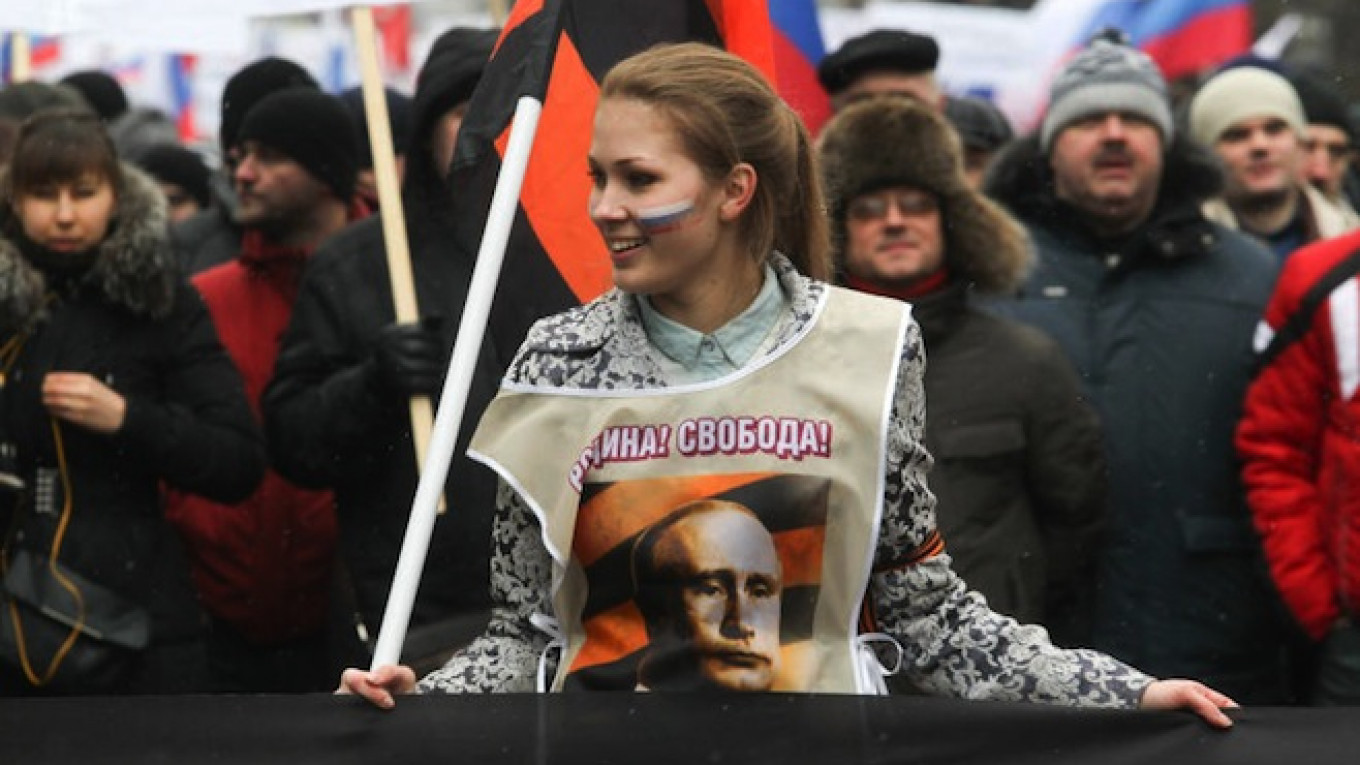The number of Russians attending pro-government rallies has increased tenfold since Vladimir Putin returned to the presidency in 2012, a study found, while enthusiasm for opposition meetings has grown only slightly.
A survey by the social research center at the Russian Presidential Academy of National Economy and Public Administration (RANEPA) showed that 16 percent of people said they had participated in a rally, up from 4 percent in 2012, the RBC news agency reported Thursday.
However, the increase was almost entirely thanks to government supporters taking to the streets: Only one percent of people had attended a pro-government rally in 2012. This year, 10 percent said they had attended.
By contrast, 3 percent of respondents this year said they had participated at opposition meetings, up from 2 percent in 2012. Three percent of those polled said they had been to both government and opposition rallies.
The surge in pro-government activity follows a crackdown on opposition demonstrations and independent media since Putin was elected to a third term as president in 2012. Within months of his election victory, authorities began making arrests at a protest movement against alleged violations at parliamentary elections the previous winter.
More recently, state media have portrayed Russian support of separatists in Ukraine and bombing in Syria as heroic battles against nationalism, terror and malign U.S. influence, fueling a surge in support for the government and pushing Putin's approval rating last month to a new record of almost 90 percent.
One-quarter of respondents to the RANEPA survey said they were ready to attend a pro-government rally, up from 6 percent three years ago, according to RBC. Six percent said the same about opposition demonstrations, up from 4 percent in 2012.
Most staunch in their support were pensioners, one third of whom said they would attend a pro-government meeting. But support has risen fast among young people: Twelve percent of Russians aged 18-25 said they would come out to support the government, up from only 1 percent in 2012.
The swelling willingness to back the government also comes amid a recession that is worsening Russians' quality of life. Wages have shrunk in real terms by nearly 10 percent in the past year, and pensions are set to rise in 2016 by far less than the rate of inflation — a first in recent years.
On Wednesday, authorities said that 85,000 people had attended an official rally for Unity Day in Moscow, compared to 75,000 last year.
Valery Federov, chief of state-run pollster VTsIOM, told RBC that just as important as Putin's popularity was effective organization by pro-government forces.
“In some sense this is a demonstration of power ahead of an election year,” he said. Russia will hold parliamentary elections in 2016.
The RANEPA survey polled 6,104 people in 10 Russian regions, according to RBC. No margin of error was given.
Contact the author at p.hobson@imedia.ru
A Message from The Moscow Times:
Dear readers,
We are facing unprecedented challenges. Russia's Prosecutor General's Office has designated The Moscow Times as an "undesirable" organization, criminalizing our work and putting our staff at risk of prosecution. This follows our earlier unjust labeling as a "foreign agent."
These actions are direct attempts to silence independent journalism in Russia. The authorities claim our work "discredits the decisions of the Russian leadership." We see things differently: we strive to provide accurate, unbiased reporting on Russia.
We, the journalists of The Moscow Times, refuse to be silenced. But to continue our work, we need your help.
Your support, no matter how small, makes a world of difference. If you can, please support us monthly starting from just $2. It's quick to set up, and every contribution makes a significant impact.
By supporting The Moscow Times, you're defending open, independent journalism in the face of repression. Thank you for standing with us.
Remind me later.






